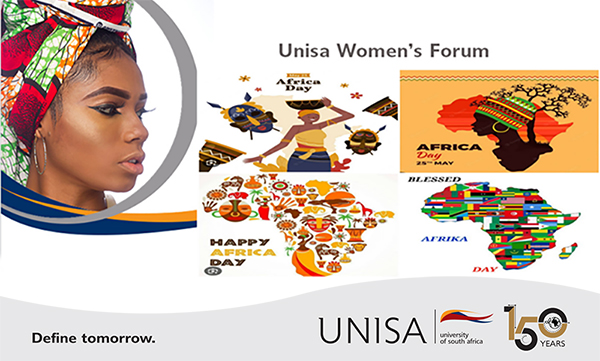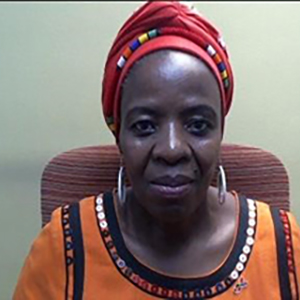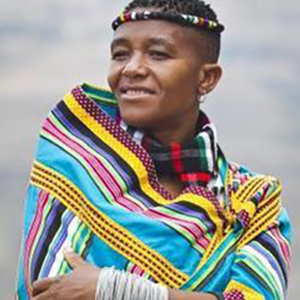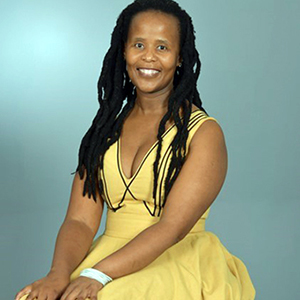
This year’s 60th Africa Day anniversary marked the African continent’s strive towards unity, peace, accomplishing the African Union’s Agenda 2063 and the United Nation’s (UN’s) Sustainable Development Goals. It was also an opportunity to celebrate epochs that shaped Africa to where it is today since decolonisation.

Since 1963, Africa Day has been commemorated on 25 May annually. The Unisa Women’s Forum (UWF) hosted this momentous day focusing on issues such as indigenous sustainability, self-reliance and peace.

Adv Nandipha Ntsaluba
Renowned scholar, Advocate Nandipha Ntsaluba, presented on "Creating a safer Africa in a better world", and posited that Africa must rely on its technologies to advance economic growth. "Therefore," she elaborated, "African academics must deepen their research into information and communication technology (ICT) infrastructure to enable participation in, among others, the internet governance architecture, data privacy and cyber security for Africa’s betterment. Ntsaluba spoke from an expert perspective in these areas. Reiterating on her theme, Ntsaluba said that creating a safer Africa will enhance peace, stability and development within the ICT environment.
Recognising Africa Day’s significance, Ntsaluba said that the focus should be on accelerating the implementation of the African Continental Free Trade Area (AfCFTA), and that there should be maximum participation of women and the youth, thereof. She added: "The enablers of AfCFTA must promote Africa’s pricing platforms and world-class ICT infrastructure."
Ntsaluba also encouraged women to participate at the UN’s Internet Governance Forum. "Importantly," she continued, "we must pursue free and open-source software to avoid depending on foreign licencing in our creativity."

Mphatheleni Makaulule
Indigenous knowledge expert and internationally lionised environmental activist, Mphatheleni Makaulule, focused on "Investing in the African youth through indigenous knowledge systems". She focused on African culture preservation through knowledge sharing and other practical methods to sustain Africa’s identity for future generations. Makaulule added that indigenous knowledge is a description of culture, and the ancestors’ way of life passed on through generations.
"We cannot celebrate Africa without building a platform for our youth to carry on its heritage. We cannot define tomorrow if we cannot claim our African identity," Makaulule asserted. She further encouraged African universities not to shelve the continent’s indigenous knowledge, but to advance it and its practices.
She also lamented that young graduates should not depend on the government for employment, but rather use indigenous knowledge to create jobs. For Makaulule, young people are ignored in indigenous knowledge spaces by trends that disconnect them from their African identity, which culminates from colonial ideas. She continued: "These ideas perceive African culture as backward, outdated and uncivilised." Therefore, she encouraged communities to engage in innovative indigenous knowledge practices instead of looking up to the West.
Makaulule also encouraged academics to incorporate Indigenous knowledge in laboratories, including in subjects such as physics and mathematics. Further, she said that young people must honour their indigenous knowledge, and universities should be the major participants in this investment.

Prof Zethu Cakata
Prof Zethu Cakata, of Unisa’s Department of Psychology in the College of Human Sciences’ presentation was titled "Knowledge investment is sustainable investment". She said that during her doctoral study, while exploring the status of indigenous languages in a democratic South Africa, one of her participants stated that all successful nations rely on their native languages as languages of business. This statement prompted her to explore further what language possesses.
Cakata also recalled renowned chef Jamie Oliver’s statement that people who consume traditional food live longer, further prompting her to question what native food and native languages possess that make people thrive. "Surely," she added, "the point driven here is self-reliance, which can manifest through self-knowledge. Our languages enhance self-knowledge and knowledge of the universe that holds us." According to Cakata, to affirm Africans as knowledge holders, there must be an investment in their knowledge for sustainability.
Cakata also acknowledged Unisa as an esteemed university of the land that promotes work that benefits humanity and advances self-knowledge. Speaking about the relevance of Africa Month, she invited everyone to invest in themselves. Cakata concluded: "Africa is us; therefore, we must invest in sustainable leadership and development."
#Unisa150
* By Godfrey Madibane, Acting Journalist, Department of Institutional Advancement
Publish date: 2023-06-01 00:00:00.0